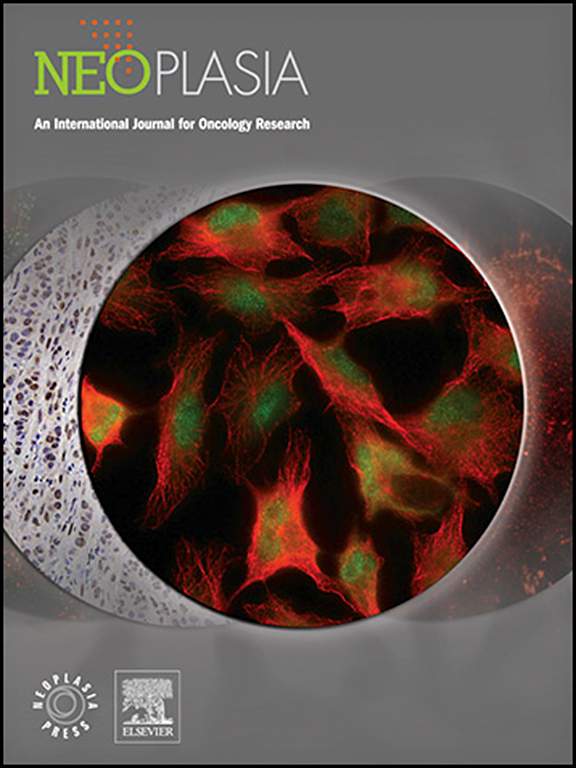Spatial profiling of METex14-altered NSCLC under tepotinib treatment: Shifting the immunosuppressive landscape
IF 4.8
2区 医学
Q1 Biochemistry, Genetics and Molecular Biology
引用次数: 0
Abstract
MET inhibitors have demonstrated efficacy in treating patients with non-small cell lung cancer (NSCLC) harboring METex14 skipping alterations. Advancements in spatial profiling technologies have unveiled the complex dynamics of the tumor microenvironment (TME), a crucial factor in cancer progression and therapeutic response.
This study uses spatial profiling to investigate the effects of the MET inhibitor tepotinib on the TME in a case of locally advanced NSCLC with a METex14 skipping alteration. A patient with resectable stage IIIB NSCLC, unresponsive to neoadjuvant platinum-based chemotherapy, received tepotinib following the detection of a METex14 skipping alteration. Paired pre- and post-treatment biopsies were subjected to GeoMx Digital Spatial Profiling using the Cancer Transcriptome Atlas and immune-related protein panels to evaluate shifts in the immune TME.
Tepotinib administration allowed for a successful lobectomy and a pathological downstaging to stage IA1. The TME was transformed from an immunosuppressive to a more permissive state, with upregulation of antigen-presenting and pro-inflammatory immune cells. Moreover, a marked decrease in immune checkpoint molecules, including PD-L1, was noted. Spatial profiling identified discrete immune-enriched clusters, indicating the role of tepotinib in modulating immune cell trafficking and function. Tepotinib appears to remodel the immune TME in a patient with METex14 skipping NSCLC, possibly increasing responsiveness to immunotherapy.
Our study supports the integration of genetic profiling into the management of early and locally advanced NSCLC to guide personalized, targeted interventions. These findings underscore the need to further evaluate combinations of MET inhibitors and immunotherapies.
特泊替尼治疗下METex14改变的NSCLC的空间谱分析:改变免疫抑制格局
MET抑制剂在治疗携带METex14跳变的非小细胞肺癌(NSCLC)患者方面已显示出疗效。空间剖析技术的进步揭示了肿瘤微环境(TME)的复杂动态,而TME是影响癌症进展和治疗反应的关键因素。本研究利用空间谱分析技术研究了MET抑制剂特泊替尼对具有METex14跳越改变的局部晚期NSCLC肿瘤微环境的影响。一名对新辅助铂类化疗无反应的可切除IIIB期NSCLC患者在检测到METex14跳变后接受了特博替尼治疗。对治疗前和治疗后的配对活检组织进行了GeoMx数字空间谱分析,利用癌症转录组图谱和免疫相关蛋白面板来评估免疫TME的变化。使用替泊替尼后,成功进行了肺叶切除术,病理分期降至IA1期。免疫TME从免疫抑制状态转变为更宽容的状态,抗原递呈和促炎免疫细胞上调。此外,包括 PD-L1 在内的免疫检查点分子也明显减少。空间谱分析确定了离散的免疫富集簇,表明了特泊替尼在调节免疫细胞贩运和功能方面的作用。在一名跳过METex14的NSCLC患者身上,特泊替尼似乎重塑了免疫TME,可能提高了对免疫疗法的反应性。我们的研究支持将基因图谱分析纳入早期和局部晚期NSCLC的治疗中,以指导个性化的靶向干预。这些发现强调了进一步评估MET抑制剂和免疫疗法组合的必要性。
本文章由计算机程序翻译,如有差异,请以英文原文为准。
求助全文
约1分钟内获得全文
求助全文
来源期刊

Neoplasia
医学-肿瘤学
CiteScore
9.20
自引率
2.10%
发文量
82
审稿时长
26 days
期刊介绍:
Neoplasia publishes the results of novel investigations in all areas of oncology research. The title Neoplasia was chosen to convey the journal’s breadth, which encompasses the traditional disciplines of cancer research as well as emerging fields and interdisciplinary investigations. Neoplasia is interested in studies describing new molecular and genetic findings relating to the neoplastic phenotype and in laboratory and clinical studies demonstrating creative applications of advances in the basic sciences to risk assessment, prognostic indications, detection, diagnosis, and treatment. In addition to regular Research Reports, Neoplasia also publishes Reviews and Meeting Reports. Neoplasia is committed to ensuring a thorough, fair, and rapid review and publication schedule to further its mission of serving both the scientific and clinical communities by disseminating important data and ideas in cancer research.
 求助内容:
求助内容: 应助结果提醒方式:
应助结果提醒方式:


